2012 Yamaha FX SHO Review
Makeover brings increased form and function to flagship model
Check out the 2012 Yamaha FX SHO and you’ll discover a craft that is both familiar…and yet newly fresh.
The familiarity stems from a deck that bears more than a passing resemblance to its 2011 counterpart, and an engine that remains identical to that which powered the previous model. That freshness is the result of a few new tweaks and features. A new angular deck design has given the craft a style makeover, as have new longer dimensions. New features have also addressed some of the craft’s previous shortcomings.
A better FX SHO? Most definitely.
New And Improved
Start with the basics. Yamaha chose to focus on rider and passenger comfort when retooling the FX line. The 2012 version of the craft is longer by 7.5 inches, with about half that length devoted to more saddle room and the rest to the aft boarding area. That tail end gets additional attention with a new spring-loaded boarding step. Yamaha made the step both wider and deeper for ’12, but more importantly, flattened the actual step area. Now, it’s more comfortable to actually step on, let alone leverage your body upwards toward the deck.
The boarding process itself is also easier. A new grab handle has been added at platform height to compliment the saddle-height handle. The idea is to make boarding more like climbing a ladder. It will be appreciated, especially by those who may have struggled with deep-water boarding in the past.
Yet another nod to comfort and ease of use can be found in the new Command Link buttons.
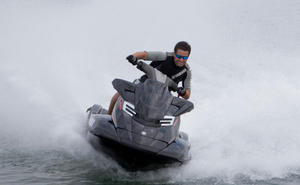
Yamaha took the buttons that switch modes on the display and relocated them from the display area itself to a new position forward of the seat and behind the handlebars. The repositioning eliminates that awkward reach over the bars to hit a button and places the controls front and center. It’s a simple idea, but a surprisingly substantial improvement in comfort and ease of use.
My favorite new feature, however, is likely the new “mechanical” neutral. Engineers added a detent in the throw of the reverse lever so that it can now stop in a position that mimics a neutral setting by equally deflecting thrust fore and aft. A window on the handle shows when you’re clicked into the right spot. Start in neutral at the dock, then back away or pull forward. The only negative I can find is that the lever itself is still located to starboard, which at the least makes it awkward to apply throttle and reverse at the same time.
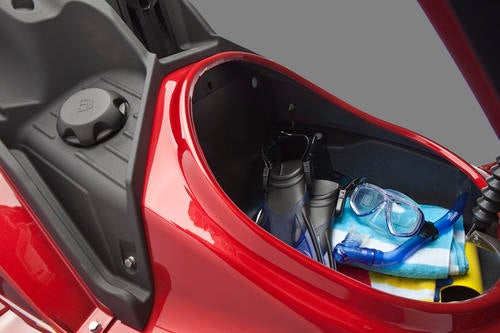 With 33.2 gallons of storage space, you can take all the essentials along for the ride.
With 33.2 gallons of storage space, you can take all the essentials along for the ride.
As to the style portion of the FX makeover, it comes mostly via panels literally attached to the previous design. These bolt-on pieces are seamlessly integrated, and give the craft an edgier look than previous models. Yamaha also capitalized on at least one of those bolt-on pieces for practical benefit. The same component that squares up the area below the aft seat edge also conceals a small wet stowage locker. It’s a handy spot to store a towrope when skiing, tubing, or boarding, and even includes a notch in the lid so that it can be closed while that ski rope is still attached to the tow eye.
Same Old Power, Far Better Ride
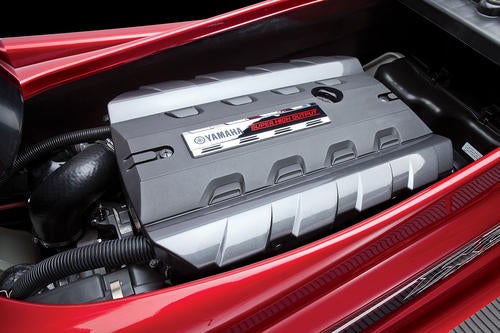 The familiar 1,812cc, supercharged, intercooled engine remains the heart of the FX SHO.
The familiar 1,812cc, supercharged, intercooled engine remains the heart of the FX SHO.Power remains the same. Under the seat is still Yamaha’s 1.8-liter SHO engine, hopped up with a supercharger and intercooler to provide quick reflexes out of the hole, a 65 mph top speed, and plenty of midrange punch en route. Like all Yamahas, it’s optimized to run on 87-octane gasoline. No premium price hit here.
But while that engine may be familiar, I found the ride quite new. Previous generation FX hulls could occasionally wobble slightly in the turns, as the hull fell on and off its running pad and onto the chines. The SHO’s new longer hull and redesigned sponsons seems to have eliminated that tendency. In fact, I flew at our photo boat at full speed, carving a beautiful, predictable corner at nearly the last minute. Rather than jerk, the hull responded with smooth, agile reflexes that inspired a great deal of confidence and had me wanting to stay out on the water at day’s end. What can I say, it’s a fun ride.
Cornering and acceleration can still be enhanced with trim. It’s manually operated, the nozzle linked to a twist grip on the left handlebar. Its five positions take out the guesswork and allow the driver to keep their eyes on the water, but it can be hard to adjust at high speed, as the force of thrust exiting the nozzle competes with your twist at the grip.
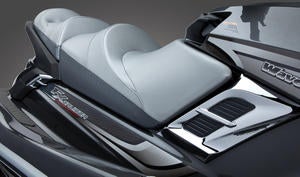 New fabric improves the saddle’s look and feel.
New fabric improves the saddle’s look and feel.Other notable features? The steering column can be tilted up or down for comfort, and the craft can be “locked” via an auto-style remote, a gadget that can also activate a slow RPM mode. Electronic throttle also means you get cruise control and no-wake mode, two features that take the hassle out of holding a steady finger on the throttle and lock the craft in at preset speeds; it’s easily disengaged by releasing the throttle.
The saddle has also gotten some attention. Though not the Cruiser style of its counterpart, it ramps as you move aft to allow passengers a better view forward. Individual levels also keep everyone in their own individual spot. Upgraded fabric and stitching improve both looks and feel.
In Your Face?
My first impression was that the FX makeover would be a subtle upgrade, and from a distance that appears to be the case. Get up close, however, and the newfound features shine through. It’s got aggressive looks, some cool new practical features that address rider control and ease of use, and as promised, rider and passenger comfort is improved.
In short, an already good craft…has gotten better.
Related Reading
2012 Yamaha FX Cruiser SHO Review
2012 Yamaha FX HO Review
2012 Yamaha FZR Review
| 2012 Yamaha FX SHO Specs | |
| Length | 130.2 inches |
| Beam | 48.4 inches |
| Dry Weight | 851 lbs |
| Engine | Supercharged w/intercooler 4-cylinder EFI |
| Displacement | 1,812 cc |
| Bore and Stroke | 86mm x 78mm |
| Compression Ratio | 8.6:1 |
| Rated Horsepower | N/A |
| Fuel Capacity | 18.5 gal. |
| Combined Stowage Capacity | 33.2 gal. |
| Colors | Eclipse Black or Crimson Red Metallic |
| Price | $13,999 |
Get PersonalWatercraft.com in your Inbox!
Like PersonalWatercraft.com on Facebook
Comments
Most Popular
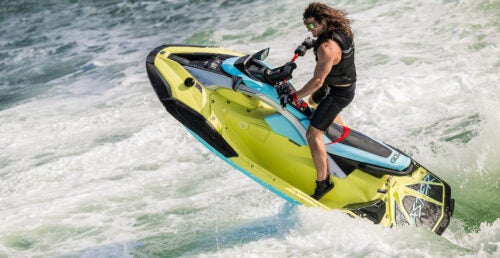
2025 Yamaha JetBlaster PRO 2-Up Review
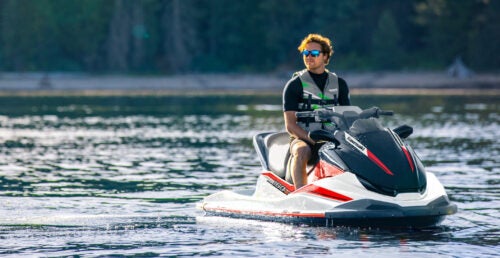
2024 Kawasaki Jet Ski STX 160X Review
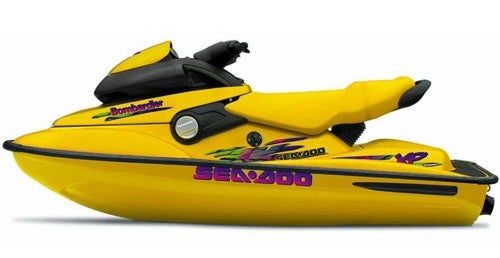
Remembering the Sea-Doo XP
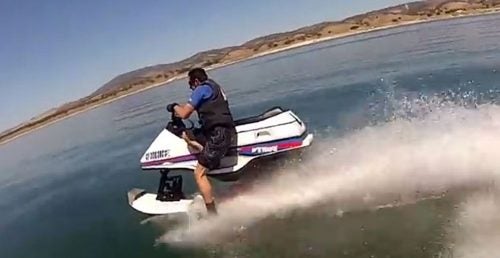
Whatever Happened to the Wetbike?
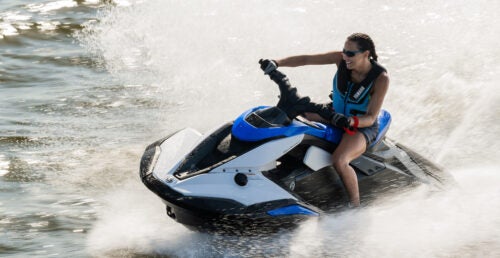
2025 Yamaha JetBlaster Review
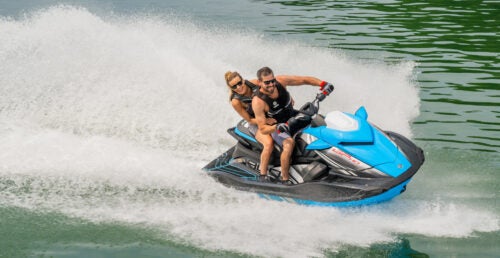
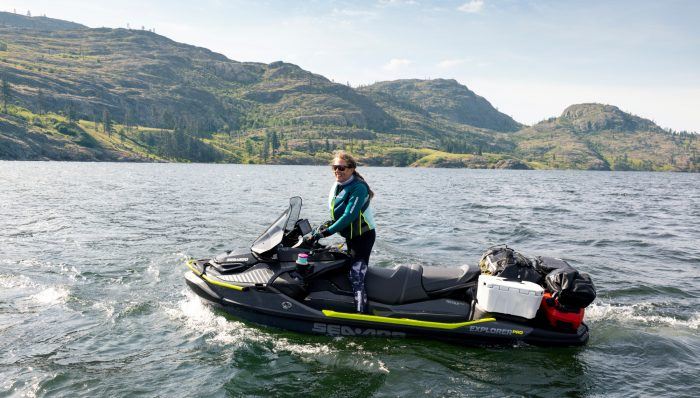
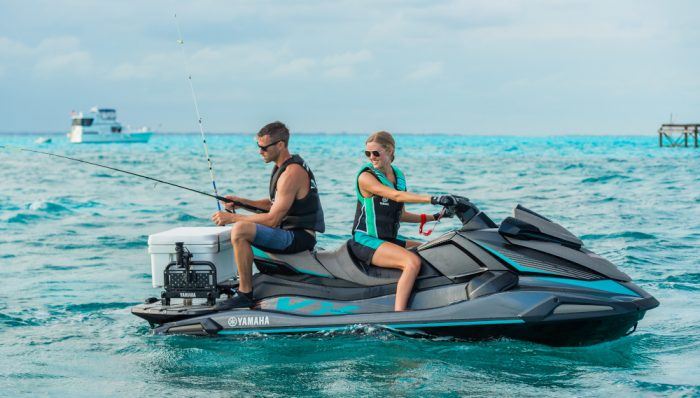

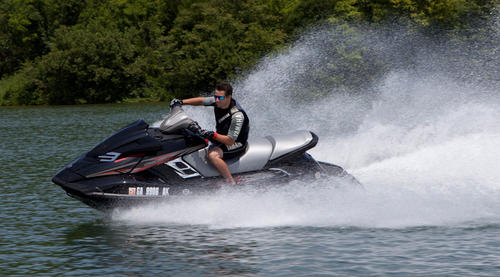
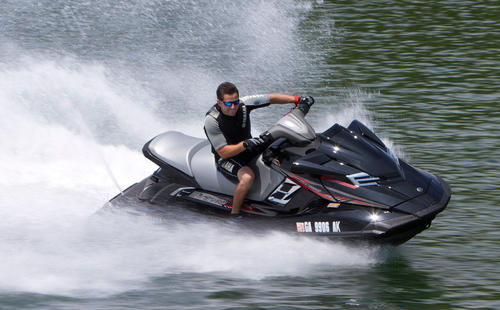
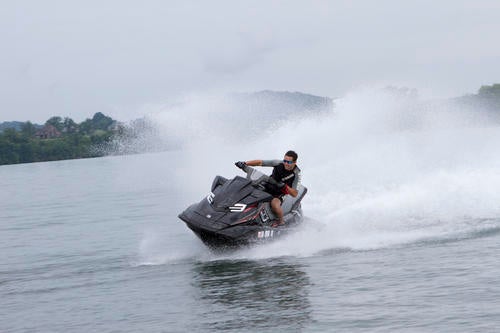



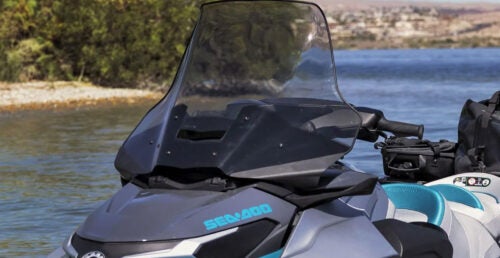
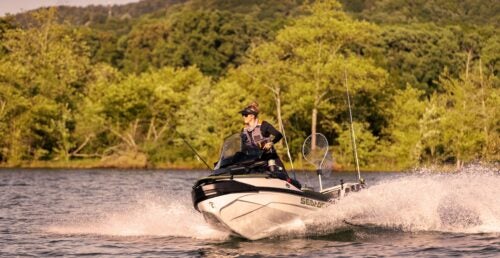


 Your Privacy Choices
Your Privacy Choices